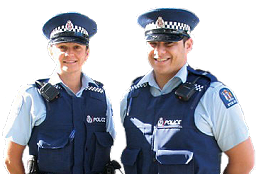(Seeing as I have stated that I have already posted an essay on Policing, I suppose I had better actually write it)
.

Writing about Policing gets very complicated very quickly because it intrinsically ties in with the Law, Courts, Justice and the Penal system, etc. and none of these things can truly be dealt with in isolation. Also I am simply not qualified to write a comprehensive critique, so I not going to attempt to. Instead I will try to tease out a few threads that I have some thoughts on. Hopefully in the process I can also sketch out the begins of a structure for defining the Policing role and function that is coherent and distinct from other institutions or roles. For instance, search and rescue is definitely not a policing function to my mind. Fisheries protection is a policing role, but to what extent should that be exclusive to the Police or managed in a cooperative arrangement with other agencies? The list goes on and on and on, but I will try to keep this examination as constrained as possible.
I don’t suppose you can get anywhere without at least delineating the boundaries to some extent, so I will take a shot at that. A short and definitely not comprehensive list of Laws, illustrate the types of Laws and some examples of them:
- Constitutional – government, legislation, lawmaking, citizenship, civil rights
- International – treaties, alliances, extradition, maritime, aviation
- Criminal – murder, assault, theft, vandalism, drugs, firearms
- Commercial – fraud, misrepresentation, contract/tort, property, patent/copyright, Tax, banking, debt, negligence
- Infringement – traffic, rubbish/pollution, noise
- Misc – libel, licenses, food safety, parol, animal welfare, family, building
- Religious – sharia, canon
Fairly obviously policing all of that would be a huge task and in reality the police couldn’t and doesn’t get involved in much of it, there are other separate authorities to handle a variety of specific areas. Currently the NZ police operate under a couple of umbrella principles:
“ the state is that which authorizes and controls the legitimate monopoly of the use of force/violence. The police carry out enforcement of the laws at the request of the government or the courts. Conversely, a failed state is one which cannot implement or enforce policies; their police no longer control security and order and society moves into anarchy, the absence of government” – And – “ a central feature of the New Zealand legal system is the division between civil and criminal law.”
- Civil law means the legal rules and processes that apply to disputes between individuals or organisations that society has determined are essentially private matters. Examples are the laws dealing with breach of contract, defamation, the recovering of debts, and family disputes over care arrangements for children. The state provides a framework for resolving these matters and for enforcing the outcome, but, unlike with criminal law, the state doesn’t actively investigate and prosecute breaches of the civil law. Civil penalties frequently involve only the payment of money.
- Criminal law involves conduct that society has outlawed as a threat to the safety or welfare of the public, and that is therefore investigated, prosecuted and punished by the state (through the Police and the courts). Unlike civil penalties, criminal penalties can involve depriving the offender of their freedom (prison). Criminal offences include, for example, murder, assault, rape and other sexual violations, robbery and theft, and dealing in illegal drugs.
I don’t have a problem with any of that per-se, my problem is with how exactly we go about implementing that policy. From a theoretical basis on paper we progress to an institution that has developed into its current expression through custom and practise, and also through expediency and exigencies.
According the NZ Police website, their roles and responsibilities covers:
111 Emergency, Armed offenders, beat and patrol, communications centres, community policing, counter terrorism, criminal investigation, diplomatic protection, dive, diversion, Police dogs, drugs, E-crime, bail, ethnic relations, financial, fingerprints, firearms, forensics, international, Interpol, licensing and vetting, maritime, missing persons, traffic, search and rescue, statistics, victim support, youth education, Prosecutions.
So that is 30 roles right there and that wont be the whole of it either. As I have already said in my “National Guard” post, search and rescue is something that I don’t think the Police should be doing and is a role that would be better served by splitting it off into another organization. In fact there are plenty of other candidates for reassignment as well. On the basis that there is plenty of policing functions that the Police already don’t handle, then it is of no particular moment if there were to be several more. Possibly the Police would even welcome the reduction in workload and responsibilities, or perhaps not, but in any case that is a decision for the State to make, not a subordinate institution.
So, to re-examine that current list of roles and highlight those that could be considered for reassignment: (Blue for police and red for other)
111 Emergency, Armed offenders, beat and patrol, communications centres, community policing, counter terrorism, criminal investigation, criminal intelligence, diplomatic protection, dive, diversion, Police dogs, drugs, E-crime, bail, ethnic relations, fingerprints, firearms, forensics, international, Interpol, licensing and vetting, maritime, missing persons, traffic, search and rescue, statistics, victim support, youth education, Prosecutions, financial – to which I would add – serious fraud, commerce and banking.
Quite clearly of course the police would still need to liaise very closely on those other roles, but they don’t need to be managing them in the sense of having those functions and departments under their command and budget structures. Where those other roles would go to I wont elaborate in this essay, but there are a good number of options, and good rationales for doing so too. Hopefully, more than anything, what it would primarily do is lead to a better focus and level of expertise and effectiveness in the core policing role. A reduction in roles and a much clearer strategic plan should affect superior outcomes.
This sort of reorganisation would need to be done in conjunction with a similar review and restructuring in all the other facets of the legal system as a whole as well. The end result being to prevent the current situation where we have issues and instances of illegality where the trend is growing rather than subsiding. What we are currently doing is not ultimately achieving an effective or positive outcome. We arrest people for breaches of the law, they are processed through the system, and then released back into the community to repeat the whole cycle again. That sort of thing has got to stop. Much of that is no fault of the Police, but it means that police resources are taken up dealing with situations that should never have been allowed to develop in the first place. In consequence they have to triage their workload and simply leave some cases unattended, that is an unacceptable situation. We already know the why’s and wherefores of criminal behaviour, its not rocket science. We need to apply what we know effectively.
New York was a textbook case of what can be achieved with good revised policing practice. Leaving the small stuff unattended was simply a recipe for an escalation of offending until the perpetrators were finally arrested and processed for a serious crime, after having left a long trail of destruction behind them in the process. New York instituted a zero tolerance program, the merits of which can be debated endlessly no doubt, however what happened was that after concentrating on the small stuff like graffiti, vagrancy, truancy and shoplifting etc, they ended up intervening before offenders got around to committing the big stuff. The major crime statistics dropped spectacularly and suddenly it became safe and pleasant to walk around the city. A place that had been a byword for street crime became an example for other metropolitan centers. (now if only they would hook into the bankers, lol) The catalyst for that transformation was a focus on appropriate policing strategies and tactics. I doubt you would find any police officers in NZ who would argue that we are currently heading in the right direction. We have a growing drug problem and a growing prison population. Family violence is disturbingly high and so too is youth offending. The correct application of resources and approach could make a huge difference.

It isn’t that we don’t have a professional, competent and committed Police force, it is that we misuse them. We burn out many officers with pointless tasks and stressful situations that we should never have put them into in the first instance. In any job, the things that frustrate, weary and end up disillusioning people are the pointless, futile, repetitious, bureaucratic rigmaroles. People will join a service organisation to make a difference and to help people, not to be a cog in a wheel going round and around in circles or trying to stick their fingers in a dyke. The Police are caught up in a wider social problem of course, but we can ease their problems by giving them clear and focused objectives and removing a lot of the bureaucratic impedances. Cut down on the distractions and reinforce the priorities.
My red and blue division of responsibilities above is only a starting point of course. It would have to be an evolving process to see what worked best. But I would suggest that a good starting point for determining what roles to retain, what roles to divest and what priorities to pursue, would be to ask the very people on the frontline who have to implement it all. The higher up the command structure you go, up to and including parliament, you will increasingly run into conflicting and competing agenda’s. Once the bureaucratic system gets involved, that is a recipe for the status quo. Being a Revolutionary, that just isn’t going to work for me. Change is need because continuing to do the same thing will continue to get the same results.
.
